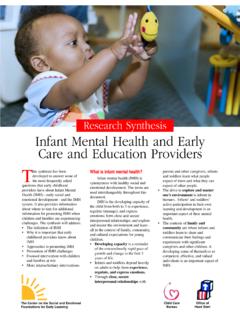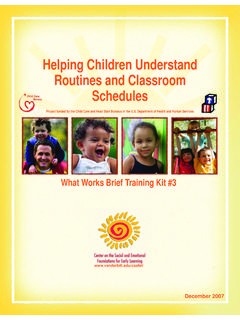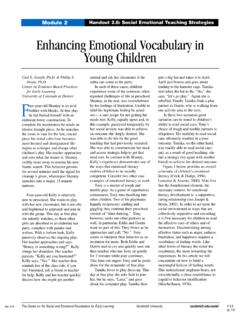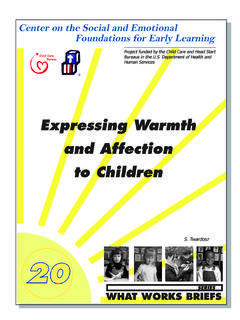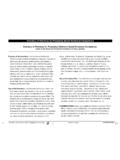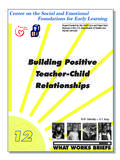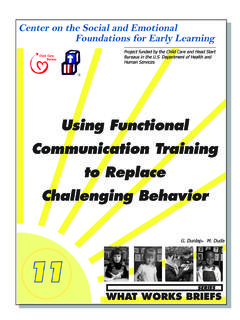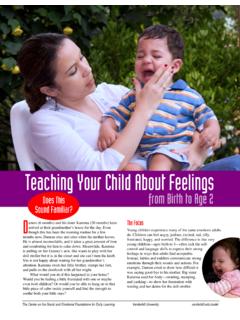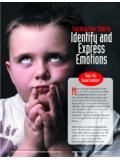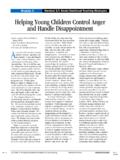Transcription of Research Synthesis Early Childhood Mental Health …
1 Research Synthesis Early Childhood Mental Health consultation Contributing Authors Overview T. his Synthesis has been developed Frances B. Duran to describe Early Childhood Young children's healthy social Kathy S. Hepburn Mental Health consultation and emotional development is critical Roxane K. Kaufmann (ECMHC) and the existing evidence to school readiness and positive long- Lan T. Le base for its effectiveness in fostering term outcomes (National Research Georgetown University healthy social and emotional Council & Institute of Medicine, 2000;. development in young children, birth Raver & Knitzer, 2002; Thompson &. Mary Dallas Allen through age 6. It provides a description Raikes, 2007). Although most children University of Alaska Anchorage of the emerging evidence base that progress in their development without many of the beliefs and much of the any significant challenges, Research on Eileen M. Brennan current body of knowledge about the high rates of preschool expulsion Portland State University consultation is grounded in literature due to challenging behaviors (Gilliam, and the experiences of Mental Health 2005) coupled with estimates Beth L.
2 Green and Early care and education (ECE) suggesting that one in 10 young NPC Research providers, educators, and other experts children exhibit problem behaviors ( , practice-based evidence). Most (Raver & Knitzer, 2002) underscores empirical Research focuses on the that this is not the case for all children. impact of consultation on child, In fact, Early Childhood providers have program, staff and, to a lesser extent, increasingly voiced concerns about family outcomes. Still, Research efforts young children showing signs of are occurring and data to support serious emotional distress and have ECMHC as an effective model for expressed the need for training and service delivery are accumulating. The Center on the Social and Emotional Child Care Office of Foundations for Early Learning Bureau Head Start assistance around managing What Is Early Childhood Mental challenging behaviors (Hemmeter, Key Terms Health consultation ? Corso, & Cheatham, 2006; Knitzer, 2000).
3 Early Childhood Mental Health Best practices: Guidelines or One approach to addressing consultation builds upon the well- practices driven by clinical wisdom or challenging behaviors, as well as established field of Mental Health other consensus approaches that do promoting social and emotional Health consultation , pioneered by Gerald not necessarily include systematic use and preventing the onset of behavioral Caplan in the mid-sixties. In Caplan's of available Research evidence issues, is Early Childhood Mental Health seminal work (1964), he outlined an (definition adapted from Resource consultation . This approach is gaining approach that involves Mental Health Guide for Promoting an Evidence- popularity among ECE programs ( , professionals working with human Based Culture in Children's Mental child care centers, Head Start and Early services staff to enhance their Health , Head Start programs, and family day provision of Mental Health services to gov/ ).)
4 Care homes), and preliminary Research clients. Similarly, in ECMHC, a findings are encouraging. In fact, professional consultant with Mental Cultural competence: A set of recent reviews of Research indicate that Health expertise works collaboratively behaviors, attitudes, and policies ECMHC yields positive social and with ECE staff, programs, and families within a system, agency, or among emotional outcomes for young children to improve their ability to prevent, professionals that allows them to work in Early Childhood settings, including identify, treat, and reduce the impact of in cross-cultural situations (Cross, reductions in preschool expulsions Mental Health problems among Bazron, Dennis, & Isaacs, 1989). (Perry, Brennan, Bradley, & Allen, children from birth through age 6 . 2006). In addition, Research shows (Cohen & Kaufmann, 2000; revised Early Childhood Mental Health : positive outcomes among ECE staff 2005). Ultimately, Early Childhood The developing capacity of infants, and programs receiving consultation Mental Health consultation seeks to toddlers, and young children to services, such as increased staff achieve positive outcomes for infants experience, manage, and express confidence in dealing with young and young children in Early Childhood emotion; form close, secure children's difficult behaviors and settings by using an indirect approach relationships; and actively explore the overall improvements in ECE to fostering their social and emotional environment and learn.
5 Essentially classroom climates (Brennan, Bradley, well-being. synonymous with healthy social and Allen, & Perry, in press). Although the field has not reached emotional development (adapted from Within the growing evidence base, full consensus on the scope of Early ZERO TO THREE, currently there are only two Childhood Mental Health consultation , ). randomized control studies guiding the Cohen and Kaufmann (2000) identified field. Thus, this Synthesis will integrate two sub-types of ECMHC that are Emerging practices: Innovations in available Research with the more frequently cited: child- or family- clinical or administrative practice that sizeable collection of knowledge from centered and programmatic address critical needs of a particular literature and practice to explore consultation . The former and more program, population, or system, but various aspects of this emerging traditional type of consultation aims to do not yet have scientific or broad practice and address the following key address the needs of an individual child expert consensus support (Hyde, Falls, questions: who is exhibiting challenging Morris, & Schoenwald, 2001).
6 Behaviors or whose social and What is ECMHC? emotional well-being may be at risk Evidence-based practices: What are the benefits of ECMHC? due to a family crisis ( , death in the Interventions for which there is What are the characteristics of family, divorce). Typically, child- or consistent scientific evidence showing effective consultants and family-centered consultation is that they improve client outcomes consultation models? provided to the child's teacher(s) and (Drake et al., 2001). What are the key challenges in parents, and is focused on helping developing and implementing these adults support children more Practice-based evidence: A range of ECMHC? effectively. In contrast, programmatic treatment services and supports that consultation takes a more systemic are accessible and culturally approach, focusing on improving the appropriate and known to be effective overall quality of the program and/or by families, youth, and providers assisting the program to solve a (National Federation of Families for specific issue that affects more than Children's Mental Health , one child, staff member, and/or family.)
7 (Cohen & Kaufmann, p. 8). This type The Center on the Social and Emotional Foundations for Early Learning Vanderbilt University of consultation is usually provided to Everhart, Gordon, & Gettman, 2006; activities will be determined, helping ECE program administrators and staff Johnston & Brinamen, 2006). to guide effective service delivery. and is intended to have a more Finally, ECMHC differs from widespread impact. Still, it is important many other approaches or evidence- The Promotion Prevention . to note that these distinctions are not based practices in that it is not Intervention Continuum always clear-cut when put into manualized ( , there is no curriculum practice, as consultants may to follow). It is characterized by Early Childhood Mental Health intermingle various strategies to meet adherence to a core set of principles consultation recognizes that achieving identified needs. ( , relationship-based) as opposed to positive social and emotional outcomes Unlike traditional one-on-one delivery of specific activities in a for young children requires a therapeutic Mental Health services, prescribed sequence.
8 Accordingly, comprehensive approach that spans a ECMHC is primarily an indirect ECMHC encourages customized continuum of Mental Health services approach. Early Childhood Mental service delivery to meet the diverse and supports from promotion to Health consultants (MHCs) strive to needs of various children, families, and prevention to intervention (Perry, improve children's social and ECE programs. As the evidence base Kaufmann, & Knitzer, 2007). Although emotional well-being by building the for ECMHC grows, the core principles many consultants are initially engaged capacity of ECE staff, parents, and of this approach will be further to provide consultation focused on an other caregivers to promote healthy solidified and the impact of various individual child needing intervention, child development and manage challenging behaviors. Consultants educate, train, and coach caregivers Table 1. What Do Mental Health Consultants Do? so that they develop the skills and confidence to effectively address A few examples: children's social and emotional needs whether it be the needs of one Promotion Activities (All Children ).
9 Child or an entire classroom of Child- or Family-Centered consultation Provide families with information on children's social and emotional development children. Although the consultant may Provide tips to families on how to create a home environment that supports healthy social provide some direct services ( , and emotional development observing children, conducting individual assessments, modeling Programmatic consultation effective practices), these activities are Assess strengths and challenges within the Early Childhood setting/environment ultimately designed to enhance Support Early Childhood staff in creating a more prosocial learning environment Engage Early Childhood staff and programs in promoting and encouraging staff wellness caregiver competence. In sum, ECMHC is both a problem-solving and Prevention Activities (Children At Risk for Behavioral Problems). capacity-building intervention. Child- or Family-Centered consultation Another hallmark of Early Conduct home visits with families and children with identified risks Childhood Mental Health consultation is Offer families training on effective strategies for addressing challenging behaviors the strong emphasis on collaboration.
10 Design and help implement targeted supports to meet the needs of a child or children at risk ECMHC's approach acknowledges that Model effective strategies and coach Early Childhood staff in using them to support a child in order to understand and address a or children at risk child's challenging behavior, one must look holistically at the environments in Programmatic consultation which the child functions ( , home, Offer ideas and resources for teaching young children social skills and appropriate behavior Guide selection and use of social and emotional screening tools classroom, community settings). This Support Early Childhood staff with classroom management strategies holistic or ecological systems perspective (Brack, Jones, Smith, Intervention (Children Exhibiting Challenging Behavior). White, & Brack, 1993) in ECMHC Child- or Family-Centered consultation necessitates that the consultant partners Provide crisis intervention services for Early Childhood staff regarding a child's behavior with ECE staff and families to jointly Engage families and staff in developing individualized behavior support plans Link child/family to community Mental Health services and assist with care coordination assess the challenge, determine appropriate intervention, and Programmatic consultation implement a coordinated plan of action Train Early Childhood staff in creating and implementing individualized behavior support across all settings.
